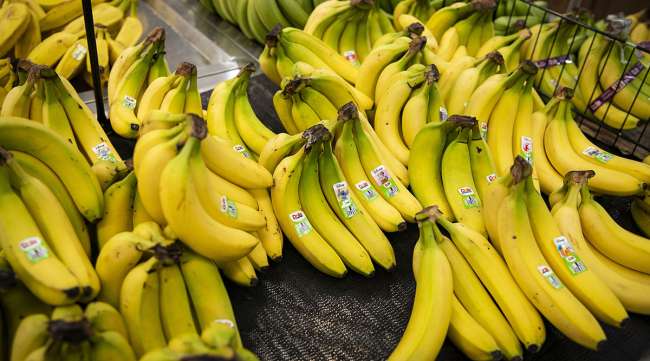Dole bananas at an H Mart grocery store in Fairfax, Va. (Al Drago/Bloomberg News)
A proposal to curb China’s dominance of the global maritime industry would have an outsize impact on bananas — and aggravate consumers already sensitive to higher prices at the grocery store, according to the largest U.S. supplier of the fruit.
“The U.S. fresh fruit trade would be severely impacted by this proposed fee but so would the consumer,” said Jared Gale, chief legal officer and company secretary for Dole Plc. Gale spoke in Washington on March 26 at a hearing on a U.S. Trade Representative proposal to charge million-dollar fees on Chinese-built cargo ships each time they visit U.S. ports.
Bananas are transported from the tropics on small, refrigerated vessels that make frequent trips and unload in the U.S. at multiple small and regional ports, Gale said. Because bananas are a low-profit margin food and cannot be grown in the U.S., the proposed fees would quickly — and noticeably — increase grocery store prices for U.S. consumers, he said.
RELATED: Walmart CEO: Food Prices Are Causing ‘Frustration and Pain’
Nick Darman of Alvys discusses the evolution of transportation management systems and workflow automation, while David Bell of CloneOps.ai shares insights from the Manifest 2025 supply chain innovation conference. Tune in above or by going to RoadSigns.ttnews.com.
Gale said Dole operates its own fleet of the specialized ships, four of which were built in China. There were no other options in the U.S. or on the second-hand market when those ships were purchased, he said.
Several other witnesses testifying at the second-day hearing warned that larger container lines could more easily pass through the costs of the plan, which the USTR says is intended to bolster the U.S. shipbuilding industry.
The plan would likely have unintended consequences for the economy for smaller vessels doing multiple port calls, witnesses said, and industries exporting lower-margin products would face higher risks of going belly up.
Alejandra Castillo, CEO of the North American Export Grain Association, said it would take many years to establish a U.S. fleet capable of serving exporters. In the meantime, farmers would have to reduce production, leading to billions of dollars in losses.
Agriculture Transportation Coalition Executive Director Peter Friedmann warned that heightened transportation costs would make prices uncompetitive, knocking U.S. products out of the global market.
“Somebody has not done their homework,” Friedmann said of the USTR proposal.
Ed Brzytwa, Consumer Technology Association’s vice president of international trade, recommended during his testimony that the USTR work with allies to counter China’s anticompetitive measures rather than take a unilateral approach and said the measure would drive up costs for consumers.







